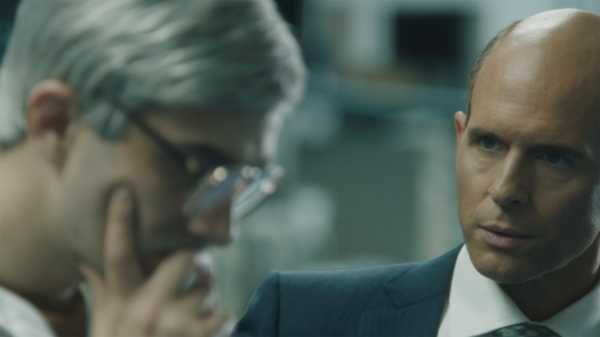
I too remember the clicking physical keyboard of my long-ago BlackBerry fondly, but the nostalgia that the movie “BlackBerry” stokes is, above all, cinematic. The movie, directed by Matt Johnson, looks backward to an era before backstory, to a time when movies just told a story without fretting about characters’ histories or psychological twists, prioritizing the clean lines of a narrative over the examination of its real-world implications and political underpinnings. In other words, it looks back to a time that never existed, and thus transforms its fact-based drama into a realistic fantasy about high-tech innovation, a just-so fable about the inevitable and catastrophic clash between the passion of invention and the brute coldness of business, about the melancholy reality of the sentimental favorites, the ingenious Davids of technology, being slain by the field’s ruthless Goliaths.
It’s the story of a pair of ingenious inventors in Waterloo, Ontario, who face seemingly insurmountable obstacles in the effort to make their innovative vision a reality—which is to say, for starters, that they don’t have the money to manufacture the device that they conceive. Mike Lazaridis (Jay Baruchel) is a plain, taciturn technical genius with a mop of early-onset gray hair and a nondescript wardrobe of basic beige dress shirts. Doug Fregin (played by Johnson), is something of a latter-day head-in-the-clouds hippie, perpetually in T-shirts, with his long hair in a tennis headband. They have an idea for a pager that sends and receives e-mail, and they have ideas for making it affordable and practicable: they’ve figured out how to transmit the data for free and how to enable a large number of simultaneous users. They bring their pitch to a commercial manufacturing company, where a hard-driving executive, Jim Balsillie (Glenn Howerton), advises them to seek venture capital, a notion that flies by their bewildered heads. When Jim gets fired for egocentric arrogance, he proposes to Mike and Doug that he invest in their company and run it for them; Doug, temperamentally independent and anti-organizational, reacts with sarcastic aggression. Mike, who’s more realistically aware of what they’re up against, accepts, becoming co-C.E.O. with Jim.
This partnership yields the cautionary tale of two technical geniuses who make a deal with the devil, which goes exactly as you’d expect: one is sacrificed to him, and the other goes over to the dark side. Because the story involves the quest for operating capital, it’s a tale about capitalism; because it involves stocks and takeovers, it’s a drama of the prevailing system of finance; because it entails chicanery, it’s a tragedy of the desperate and reckless measures that businesspeople take in order to survive the mighty forces arrayed against them—in effect, choosing between honorable failure or crooked success. The movie (written by Johnson and Matthew Miller) pushes all of these ideas so far to the fore, anecdotally and superficially, that they do nothing but sit on the surface, as if placed there on stickers.
When Jim takes charge, the change in workplace culture is extreme. Doug and Mike had been running their company, Research in Motion (“RIM”), like a nerd frat house. Jim brings in a woman to coördinate payroll—a job category that Doug and Mike never bothered with. Workdays had been filled with video games, innocent roughhousing, and sacrosanct Movie Nights. Jim, putting some corporate order into the company by way of drill-sergeant aggression, gets the major partnership that he’d sought—and, with those first successes, attracts a hostile takeover by another company, the one that manufactures the PalmPilot. (Use one of those lately?) Jim schemes to fend it off, but, having already displayed dubious business ethics, he goes further into deceit to pull off his plan. The blowback is inevitable, and the movie sets it up with a facile obviousness that might as well include ominous music played on an organ.
The movie’s business details are juicy, as befits the adaptation of a nonfiction book by Jacquie McNish and Sean Silcoff. The twists and wiles of high-tech business give the film a semi-documentary enticement that, unfortunately, detaches it from its characters. The anecdotal parade of events is also a story of personalities that are emblematized in action as if according to a screenplay manual, leaving them constantly visible yet utterly undeveloped. Life outside the office hardly exists: Mike and Doug are never seen at home, in the company of family or friends, or doing anything but their work. A single scene shows Jim at his house for a few seconds, and his obsession with hockey (and his effort to buy an N.H.L. team) is demonstrated only to the extent that it impinges on his management of RIM. There’s no dramatic point of view to account for the tight filter of dramatic information—no actual or virtual narrator, no character whose perspective the story sustains. The omniscient director seems not actually to know enough about his characters; he reduces their personalities to idiosyncrasies or mere functions of the plot.
The movie’s relentless forward motion, its drama without backstory, its narrative without digression, makes its subtractions and omissions more conspicuous and more significant than the details that it shows. As a result, the movie’s great dramatic reversal (no spoilers here, but do you know anyone who uses a BlackBerry?) arrives as an anticlimax. The nature of that reversal—slight spoiler for those who don’t remember—is the iPhone. In effect, “BlackBerry” wants to be the “Inside Llewyn Davis” of tech movies, with Steve Jobs taking the role of Bob Dylan—the figure who attains greatness while the movie’s striving hero is relegated to obsolescence and irrelevance. But Llewyn has a rich outer life of family and friends, politics and culture, that reflected the filmmakers’ textured view of his times; he had an inner life that his commercially unsuccessful music embodied. His greatness transcended his achievement. In “BlackBerry,” the protagonists, too, display flashes of greatness, mere glimpses of character, that surge to the fore. Mike’s obsession with consumer aesthetics (as revealed in his recurring irritation at a hissing intercom box and its shoddy implications), Doug’s proud insolence and his fierce devotion to the company’s free-spirited, fun-based atmosphere—these remain unconnected to any depth, extent, or complexity of experience. “BlackBerry” plays like a prototype still waiting to be realized, a sketch that’s still undeveloped. ♦
Sourse: newyorker.com






